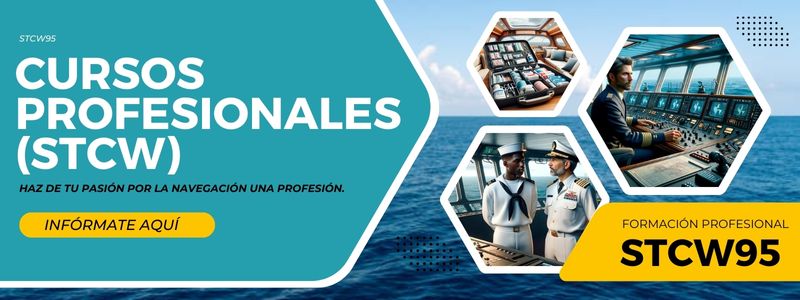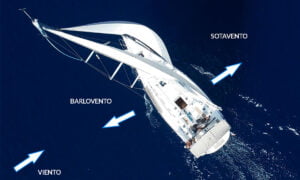If you are passionate about the world of the sea and want to make it your profession, you should know the different Merchant Navy professional titles you have access to and what each of them entails. Keep reading to find out and get closer to your professional vocation.
If you want to delve deeper into the topic of the different nautical qualifications, in this article we talk about all the types of boat licences
Deckhand (helmsman)
In order to work as a deckhand it is necessary to have obtained the Certificate of Maritime Proficiency by completing the corresponding course, as well as being able to demonstrate a minimum boarding of 2 months on merchant ships or fishing.
This title qualifies you to be part of the Navigational watch on vessels up to 500 GT whether they are fishing vessels or for steering Vessels up to 10 metres in length and up to 12 passengers in inland waters, as long as you have been authorized by the Merchant Navy thanks to a minimum of 6 months' embarkation performing services as a bridge sailor.
Naval Mechanic
This title enables you to work as ship engineering officer merchant ships with a maximum power that may vary depending on the type of shipment you are accrediting:
- Minimum boarding of 12 months, 6 of whom have been as a student of machines, boats of up to 3000 kW of power.
- Same conditions with additional 6000 kW course It will allow you to work on vessels with up to 6000 kW of power.
Depending on the time and type of accredited internship, you will be able to perform as engineer officer (vessels up to 6000 kW), first engineer officer (ships up to 3,000 kW) and chief engineer (vessels up to 1400 kW).
Are you interested in: What ranks are there in the merchant navy?
Senior Naval Mechanic
If you want to be a major naval mechanic, you must get one of the following titles:
- Senior Technician in the Organization of Maintenance of Ship and Boat Machinery.
- Senior Technician in Supervision and Control of Ship Machinery and Facilities.
- Maritime-fishing specialist technician, mechanical specialty (pending regulation).
As well as proving a period of Minimum shipment of 12 months (at least 6 as a sailor or trainee), which will enable you to work as chief engineer on ships with a maximum power of 750 kW.
Besides, Extending your internship period will allow you to gain more responsibilities, which added to the 6000 kW course, will enable you to be:
- Engineer Officer on merchant vessels without power limitation.
- First Engineer on vessels up to 6000 kW.
- Chief Engineer on vessels with power less than 6000 kW.

Engineer Officer
To work as an engineer officer it is necessary to have the Bachelor's or Diploma in Naval Machinery or an equivalent degree. Once you have obtained this qualification, you must prove the following boarding and training periods depending on the role you wish to perform:
- 12 months, of which 6 will have been as a student engineer for First Engineer Officer on vessels with up to 750 kW of power.
- 12 months as an engineering officer for First Engineering Officer on vessels up to 3000 kW.
- 12 months working as a second engineer officer for a First Officer on ships without power limitations or chief engineer on ships with up to 750 kW of power.
- 24 months as an engineering officer for chief engineer on vessels with a power of less than 3000 kW.
Chief Engineer
The next position in the ranking is Chief Engineer, for which it is necessary to be in possession of the professional title of first or second class machine officer, which in turn implies having the necessary university degrees.
As for the practices, a certificate must be accredited Boarding for more than 36 months serving as an engineer officer, which can be reduced to 24 months, provided that at least 12 have been spent serving as first officer.
The accreditation of the degree and internship will allow you to work as Chief Engineer, First Mate or Engineer Officer on vessels without any power limitation.
Are you interested in: Navigation License in Barcelona
Port skipper
You will be able to work as a Port Captain on merchant ships under the following conditions:
- Gross tonnage equal to or less than 100 GT (Gross Tonnage).
- Navigations below 3 miles from the port.
- 150 passengers maximum.
If you want to obtain the title of port captain you must complete a 150 hour course and accredit more than 12 months of shipment, 6 of which must be in bridge service and 6 more in engine service.
Coastal pattern
This title will allow you to work as a bridge officer on merchant ships of up to 1600 GT or as Skipper or First Mate on vessels up to 200 GTIn both cases, you can carry a maximum of 250 passengers and travel up to 30 miles from the coast.
How to get it?
- Vocational Training of Intermediate Degree in Navigation and Coastal Fishing.
- 12 months of shipment as sailor.
- 12 months of shipment as official on vessels with at least 20 GT.
Height pattern
Once you make the Higher level FP in Maritime Transport and Deep Sea Fishing and prove a minimum shipment of 12 months as a sailor and another 12 months as a bridge officer On vessels with a minimum gross tonnage of 20 GT, you will be able to work as:
- First mate on merchant vessels of 3000 GT maximum.
- Bridge Officer on vessels up to 3000 GT.
- Pattern on vessels with a maximum gross tonnage of 500 GT.
- All of them with a maximum passage of 350 passengers and without going further than 60 miles of the coast.
First and second class pilot
To work as a Second Class Pilot, it will be necessary to have a university degree of Diploma in Maritime Navigation or Bachelor's Degree in Nautical Science and Maritime Transport and, in addition, prove a boarding period of at least 12 months as a bridge student intern for the issuance of the title or 12 months as a bridge officer for the extension of powers.
Fulfilling all these requirements will allow you to work as:
- Bridge Officer on vessels without power limitation.
- First mate on vessels with gross tonnage up to 3000 GT.
- Captain on vessels up to 500 GT and a maximum distance of 60 miles from the coast.
For its part, a First Class Pilot in possession of the professional title and with a period of 36-month accredited shipment As a bridge officer, he may serve as First Officer on ships without power limitation or as Captain on vessels up to 3000 GT.
Captain of the Merchant Navy
The title of Captain of the Merchant Navy is obtained by being in possession of a university degree:
- Diploma in Maritime Navigation.
- Graduate in Nautical Science and Maritime Transport.
- Bachelor's or equivalent master's degree.
Or of the professional titles of First Class Pilot Merchant Navy or Second Class Merchant Navy Pilot.
In addition, you must demonstrate a boarding period of Minimum of 36 months as a bridge officer, which can be reduced to 24 if 12 of them have been as captain or first mate. With all this, you will be qualified to take command of merchant vessels engaged in any type of navigation without any limitations.






